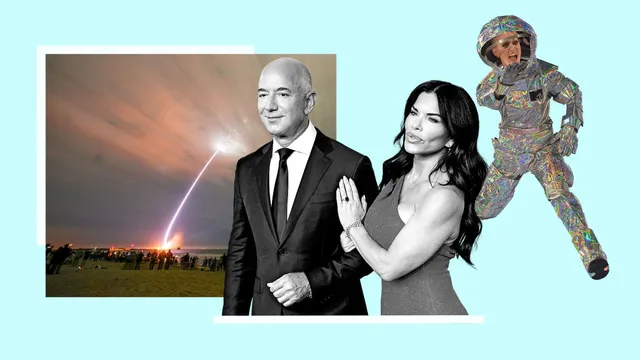
Katy Perry joins all-female crew for Blue Origin spaceflight
2025-02-27 22:20- Blue Origin has announced that Katy Perry, Gayle King, and Lauren Sanchez will join an all-female crew for a 10-minute spaceflight.
- The flight, scheduled for this spring, will reach an altitude over 65 miles above Earth.
- This mission continues Blue Origin's efforts to promote civilian space travel and is part of a broader trend of celebrities engaging in space explorations.
Express your sentiment!
Insights
In the United States, Katy Perry, renowned singer, is set to embark on a space journey alongside a select group of influential women, including TV host Gayle King and helicopter pilot Lauren Sanchez. The launch will be managed by Blue Origin, the aerospace manufacturer and spaceflight services company founded by Jeff Bezos. This is positioned to be Blue Origin's 11th human spaceflight, marking a continuation of their trend since 2021 of sending civilians on short journeys into space. The upcoming flight, though lacking a confirmed date, is anticipated to take place in the spring and will last approximately ten minutes, reaching an altitude of around 65 miles above the Earth. This brief experience is designed to showcase the thrill of weightlessness and give participants a fleeting glimpse of space, surpassing the Kármán line, which is recognized as the boundary between Earth’s atmosphere and outer space, set at 62 miles. The six-person crew was curated by Lauren Sanchez, who is not only a former TV journalist but also the fiancée of Jeff Bezos. The selection includes notable figures from various fields: Amanda Nguyen, who has been a prominent civil rights activist; Kerianne Flynn, a film producer; Aisha Bowe, a former NASA rocket scientist; and of course, the iconic Katy Perry, all of whom represent the growing push towards female representation in fields of science and technology. Katy Perry's involvement particularly is noteworthy as she gears up for her "Lifetimes Tour," slated to begin on April 23, immediately following the anticipated launch. This event underscores a larger cultural moment, where celebrities are increasingly involved in commercial space travel, mirroring famous past voyages by actors and entrepreneurs like William Shatner and Michael Strahan on Blue Origin's previous missions. These celebrity trips serve not only as high-profile advertisements for commercial space travel but also reflect a burgeoning interest in the possibilities of human space exploration, fostering conversations around the future of space and its accessibility to non-astronauts. This mission highlights a significant shift in public engagement with space travel and aims to inspire future generations to consider careers in STEM fields.
Contexts
The participation of celebrities in space travel has garnered significant attention, primarily due to the publicity and interest it generates in the realm of space exploration. As individuals with substantial media influence, celebrities have the unique ability to engage a broader audience, often sparking public fascination with space-related initiatives. This effect is particularly pronounced when the celebrities share their experiences through social media platforms, television interviews, and public appearances, thereby democratizing the idea of space travel and making it accessible to the general public. Their stories can inspire a new generation to consider careers in STEM fields, as they often emphasize the excitement and wonder of human spaceflight beyond the confines of Earth. Moreover, the involvement of well-known figures in space missions can lead to increased funding and support for space programs. Stakeholders in the aerospace industry recognize that celebrity involvement can boost ticket sales for commercial spaceflights or enhance donations for scientific research initiatives. As seen with high-profile missions like those executed by SpaceX, Blue Origin, and Virgin Galactic, ticket prices and sponsorships can skyrocket when celebrities endorse or participate in such ventures. Consequently, this dynamic helps to build archives of funding that can be diverted into more extensive research and developmental programs, further advancing our exploration capabilities. The soft power lent by celebrities also serves to improve public perception of space agencies and private companies working in the field. Additionally, the impact of celebrities participating in space travel extends to humanitarian and educational outreach programs. Many celebrities use their platforms to advocate for science education, environmental protection, and global challenges, capturing the complexities of modern society through the lens of their space experiences. Activities such as speaking engagements at schools or participating in documentaries can support educational initiatives, helping to fund and inspire future efforts in science and technology. Such outreach carries the additional benefit of fostering a more informed citizenry that understands and values the importance of space science. These narratives contribute significantly to the momentum surrounding initiatives aimed at targeting and solving various earthly issues through the solutions presented by space technology. However, there are critics who contend that the focus on celebrities can sometimes overshadow the essential work being done by scientists and engineers who have dedicated their lives to the field. The optics of celebrity flights may divert attention from the larger goals of space exploration and the scientific advancements that can arise from rigorous research processes. It is necessary to maintain a balance between leveraging celebrity influence for public engagement while ensuring that the core objectives of space travel—knowledge acquisition, technological innovation, and addressing pressing terrestrial challenges—remain at the forefront of discussions. Ultimately, while celebrities play an increasingly influential role in space travel, it is crucial for the scientific community to harness this interest effectively, steering public attention towards meaningful and impactful space exploration initiatives.